Do Weddings Have a Free Bar? Exploring Reception Trends
Weddings are a whirlwind of joy, planning, and celebration. One of the big questions during wedding planning is whether to have a free bar at the reception. Yes, many weddings do offer a free bar, commonly known as an open bar. This means guests can enjoy drinks without reaching for their wallets. This generosity often adds to the festive atmosphere and ensures everyone is having a great time.
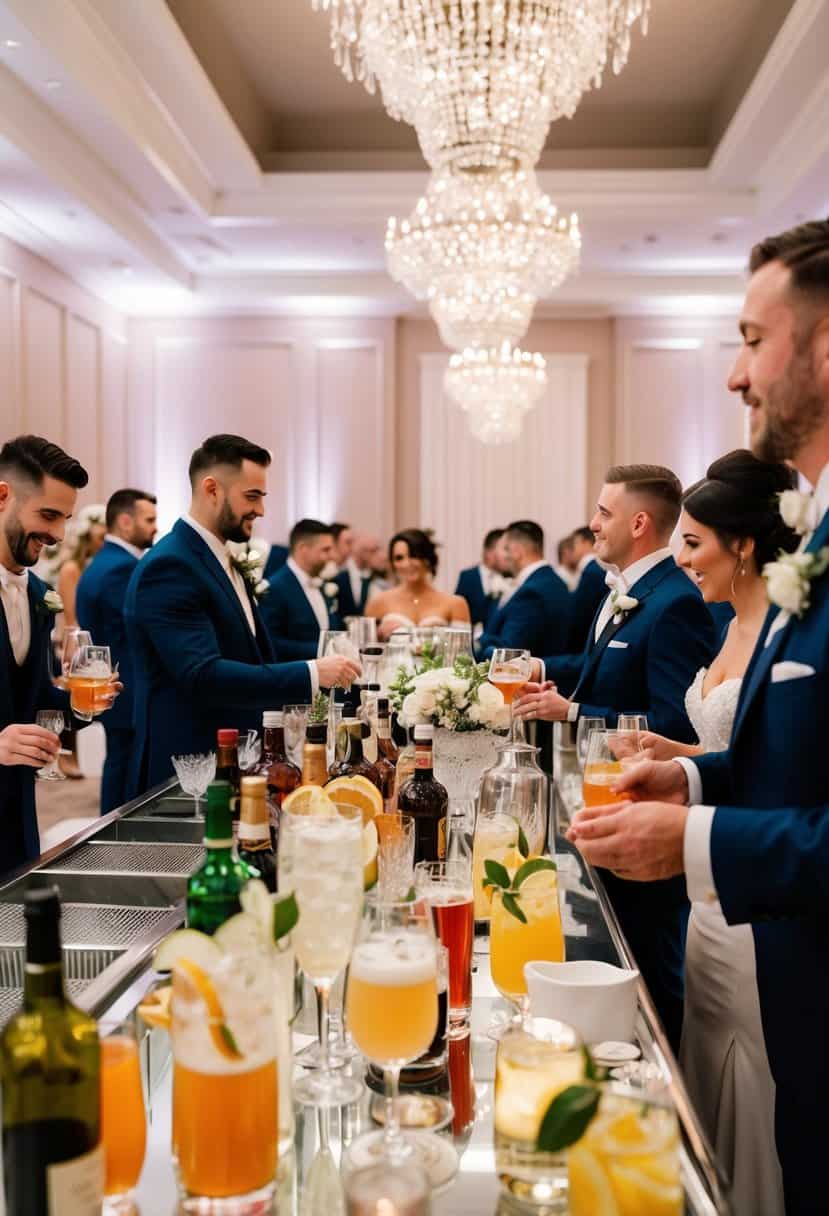
Why consider a free bar? It creates a welcoming environment where guests feel catered to, and it can make your wedding reception memorable. Your choice might depend on budget and personal preferences, as some couples may opt for alternatives like a limited bar or a cash bar, where guests pay for their drinks.
When deciding, think about the atmosphere you want to create. An open bar can lead to a livelier party vibe. If you’re unsure, offering beer, wine, and a couple of signature cocktails might be a great middle ground. Planning this aspect thoughtfully can truly enhance the celebration for you and your guests.
Understanding Bar Options at Weddings

When planning a wedding, selecting the right type of bar can impact the overall guest experience. Various bar options, such as open bars, cash bars, and limited bars, come with their own pros and cons. Here’s what you need to know to make an informed decision.
Open Bar Explained
An open bar is where guests enjoy drinks without paying individually. This option usually includes a selection of beverages like beer, wine, and basic liquors. The host pays a set price, often per guest or as a total package.
There are variations, such as full bars and modified open bars. A full bar offers a wide range of spirits, while a modified open bar might limit the selection to beer and wine or exclude high-proof spirits altogether.
Open bars are preferred for enhancing the celebratory mood since there’s no hassle for guests. Costs can be significant, so it’s important to balance guest satisfaction with the wedding budget.
Differences Between Open Bar and Cash Bar
A cash bar is the opposite of an open bar. Guests pay for their drinks, which can be a more budget-friendly choice for weddings, especially larger ones.
A cash bar removes the host’s burden of covering drink expenses but might add a commercial feel to the celebration. This setup often includes a limited menu, with basic beers, wines, and liquors.
Some couples consider a drink package, which provides a set number of drink tickets per guest. Striking a balance between cost and guest enjoyment is crucial in this decision.
The Concept of a Limited Bar
A limited bar offers a smaller selection, focusing on specific types of drinks. This could mean serving only beer and wine, or providing one or two signature cocktails alongside standard options. The aim is to maintain some level of free service while simplifying choices and managing costs.
This option allows for a personalized touch without overwhelming the budget. It also encourages guests to try specialty drinks, which can be a memorable part of the reception.
Choosing a limited bar means making deliberate choices about what to serve, ensuring that guests still enjoy their evening with enough variety.
Planning Your Wedding Bar
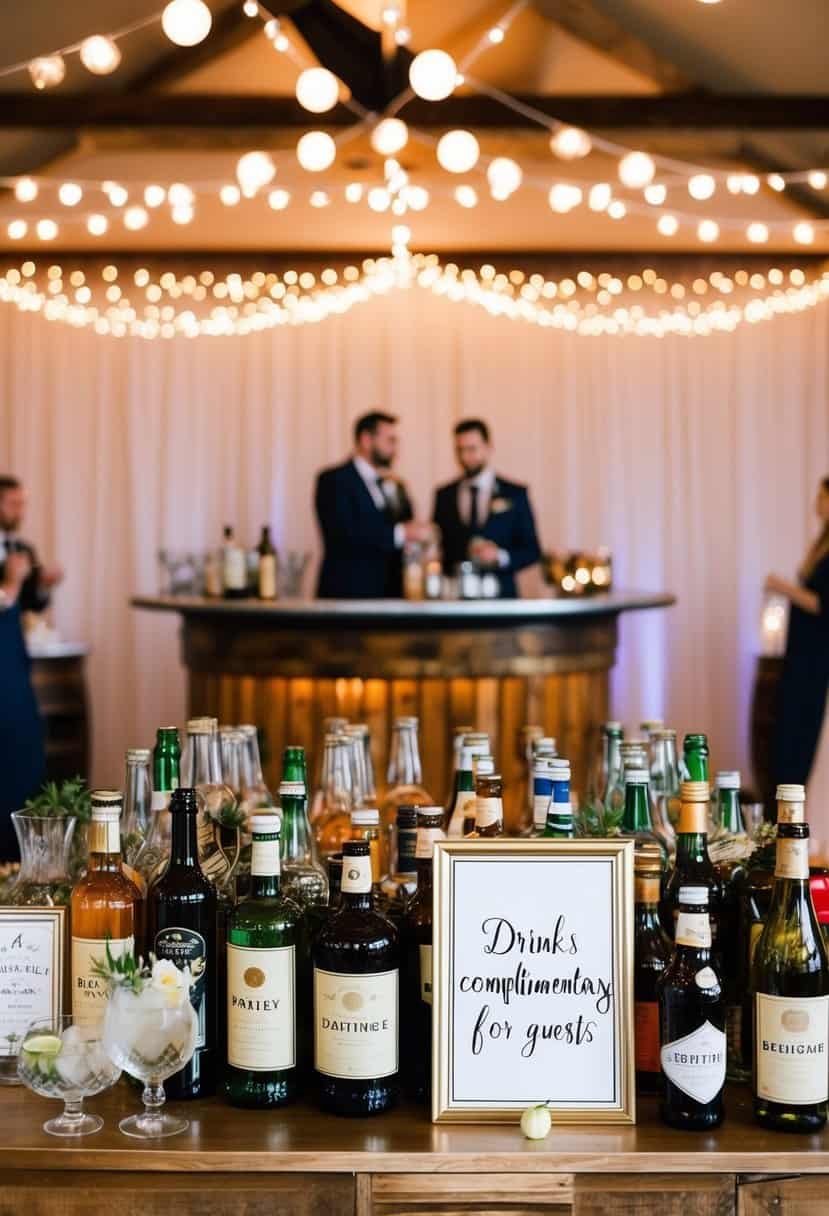
When planning your wedding bar, you’ll need to make key decisions about the drink menu, budget, and amounts of alcohol. These choices will ensure everyone has a good time without going overboard on your wedding budget.
Choosing Your Drink Menu
Start by deciding on the types of drinks you’ll serve. A typical open bar has a mix of beer, wine, and basic liquors like vodka, rum, and gin. You might want to include a few premium or top-shelf options for guests who enjoy finer tastes.
Consider serving signature cocktails that reflect your personal style or the theme of your wedding. This adds a unique touch and can also simplify the decision-making process.
Don’t forget non-alcoholic beverages. It’s important to offer sodas, juices, and water. This ensures all guests can enjoy a refreshing drink. Also, if a champagne toast is part of your plan, choose a good quality champagne to enhance the celebration.
Setting a Budget for Beverages
Establishing a budget for your wedding bar can keep costs under control. The bar can quickly become one of the largest expenses, so careful planning is essential.
Consider using drink tickets if the budget is a concern. Each guest gets a certain number of complimentary drinks, and this can prevent excessive costs while ensuring everyone gets to enjoy some beverages.
Decide whether to offer a limited selection of basic and premium liquors or to stick with beer and wine. The choice will affect your overall cost. Remember to account for extras like mixers, ice, and garnishes when setting your budget.
Calculating Alcohol Quantities
To provide the right amount of alcohol, you can use an alcohol calculator. These tools estimate how much you’ll need based on the number of guests and the drink menu.
It’s helpful to assume guests will consume about one drink per hour. This can vary based on your crowd, but it’s a good starting point. Divide your drink menu into percentages, such as 50% liquor, 25% beer, and 25% wine to meet different preferences.
Factor in a few extra bottles for a champagne toast. Having a little more than you think you need ensures you don’t run out before the night ends.
The Guest Experience
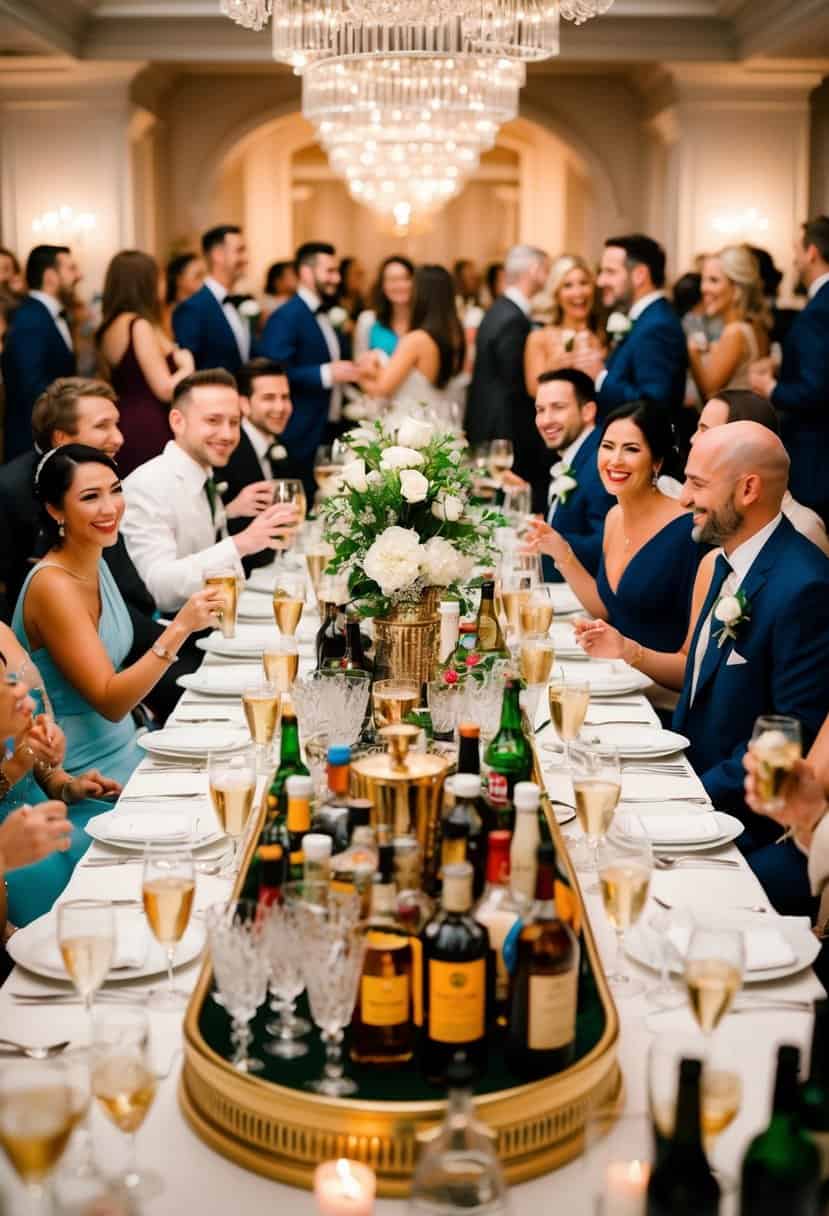
Creating an exceptional guest experience at a wedding with a free bar means acknowledging the different tastes and ensuring everyone enjoys the celebration responsibly. From catering to diverse drinking preferences to managing the risks of overindulgence, there are key aspects to consider.
Catering to Diverse Preferences
When it comes to drinks, wedding guests can have varied tastes. To keep everyone happy, offer a wide selection of beverages. This includes champagne for toasts, popular signature drinks for a unique touch, and an assortment of cocktail hour options like wines and spirits. Don’t forget the non-alcoholic beverages—water, sodas, and juices—to cater to those who prefer or need alcohol-free options.
A thoughtfully curated drink menu can elevate the party atmosphere, making everyone from your guest list feel included and appreciated. Consider hiring a skilled bartender who can make a range of drinks, helping to enhance guest satisfaction. Including a few surprise cocktails or unusual drink options can also be an excellent conversation starter.
Managing Guest Overindulgence
While enjoying a free bar, managing guest overindulgence is crucial to maintain a festive and safe atmosphere. Offer filling snacks or appetizers during the event to help mitigate the effects of alcohol. Ensure that water and other non-alcoholic choices are always available for guests to hydrate throughout the party.
Consider designating a responsible person or hiring a coordinator to discreetly monitor and address any concerns, ensuring everyone remains safe and the celebration continues smoothly. This approach acknowledges the joy of a free bar while emphasizing responsibility, so the focus remains on making happy memories rather than handling problems.
Hiring Bar Staff and Managing Logistics
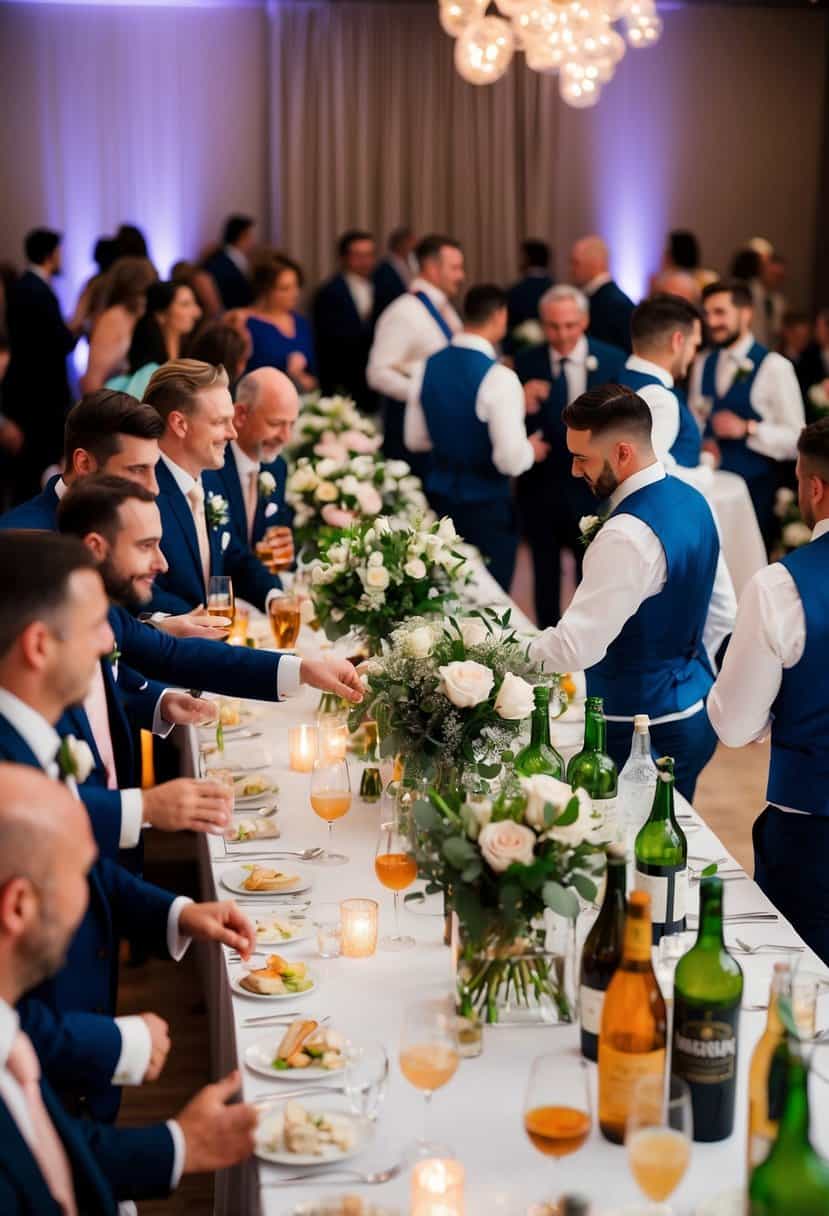
Hiring bar staff for a wedding requires attention to detail. You’ll need to find experienced bartenders who can manage the crowd and provide excellent bar service. Additionally, understanding how to handle gratuities and tip jars is essential for a smooth event.
Finding the Right Bartenders
When searching for bartenders, consider those with a strong background in event bar service. Experienced bartenders are crucial since they know how to keep drinks flowing while maintaining a friendly vibe. It’s helpful to check if they have liability insurance and adhere to local alcohol laws. This helps avoid any legal issues.
Talk with your venue to see if they have a preferred vendor list or if you must use their staff. Doing this early can save you time and ensure everything goes smoothly. Ask potential bartenders about their previous experiences and check reviews or references to get a sense of their professionalism.
Understanding Gratuities and Tip Jars
Deciding how to handle gratuities and tip jars is important. Some wedding hosts prefer to include a gratuity in the bartending fee, while others leave it to the guests. Make clear arrangements with your bartending staff on how they should manage tips.
Providing a tip jar on the bar can encourage guests to show their appreciation, but check with your venue beforehand. Some places have rules against tip jars. If you want to keep things simple, adding a gratuity in advance may be the best option. Discuss these details with your bartenders to make sure everyone is comfortable with the plan.
Considerations for a Successful Wedding Bar
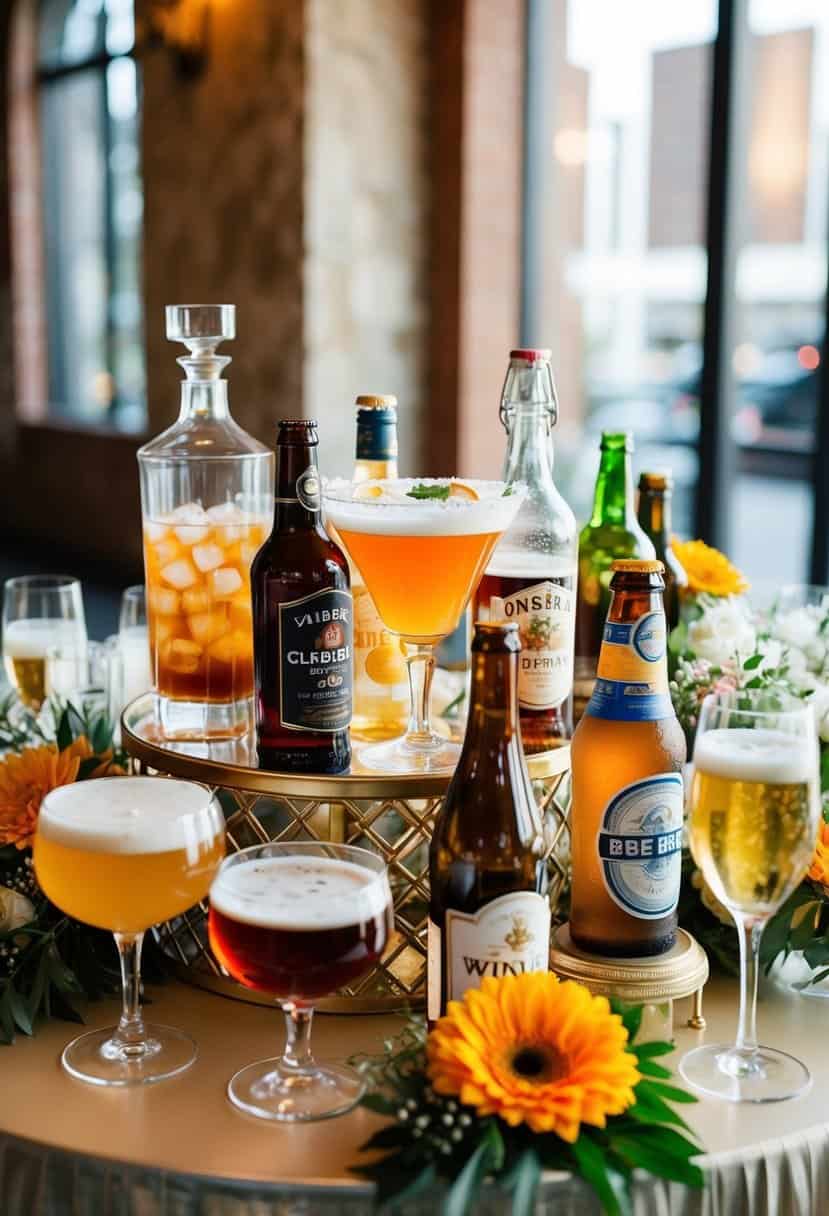
When planning a wedding, deciding on the type of bar can greatly influence the cost and atmosphere. Couples often weigh options like BYOB, managing expenses, and ensuring guests’ safety. These choices play a crucial role in how enjoyable and smooth the event will be.
Deciding on a BYOB Option
Choosing a BYOB option can be both creative and budget-friendly. You allow guests to bring their favorite drinks, which can lead to a diverse selection. It’s important to check if your venue permits BYOB as some places might have restrictions or corkage fees.
Discussing the decision with your wedding planner or venue manager aids in understanding the regulations. Consider providing a few basics such as mixers and garnishes to complement what guests bring. This ensures everyone has a good time without the pressure of stocking a full bar.
Managing the Bar Tab and Costs
Managing the bar is a balancing act between providing enough drinks and staying on budget. Open bars, where drinks are free to guests, can be expensive. Instead, consider a limited open bar with select options or a cash bar where guests pay for their own drinks.
Estimate your drink needs based on guest count and reception duration. For instance, you might need enough for approximately five drinks per guest for a five-hour event. Use this to guide your purchasing and avoid overspending.
Creating a Safe and Enjoyable Environment
Creating a safe environment is key to a fun celebration. Overindulgence poses risks, so plan to have professional bartenders who know when to cut someone off.
Providing non-alcoholic drinks and fun activities can also help manage the mood.
Consider a “dry wedding” if alcohol isn’t a primary focus, offering delicious mocktails instead.
You can keep everyone entertained and hydrated with unique options like herbal teas or fruit punches.
Providing options ensures that everyone, including non-drinkers, has a memorable time.




